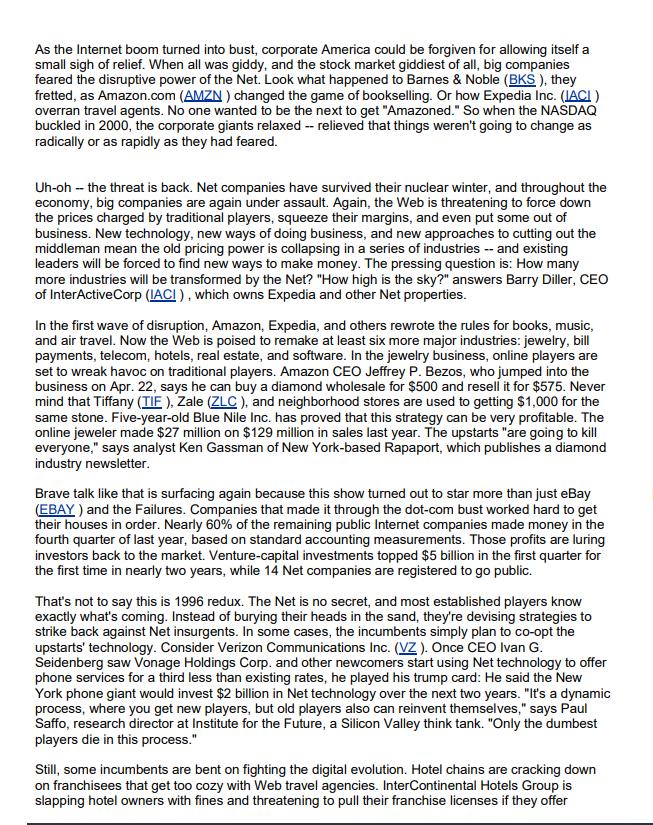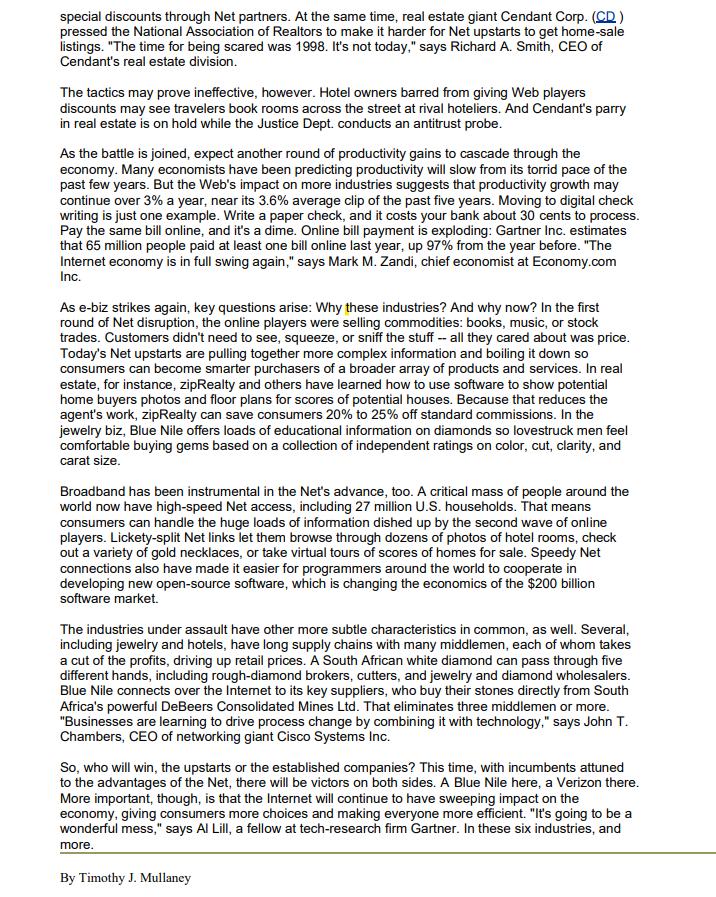Answered step by step
Verified Expert Solution
Question
1 Approved Answer
From a customer's perspective, what are the benefits and limitations of stores? Internet? Mobile? Social? Catalogs and other non-store channels? - How has this perspective


- From a customer's perspective, what are the benefits and limitations of stores? Internet? Mobile? Social? Catalogs and other non-store channels? - How has this perspective changed with the recent impact to stores due to the Covid-19 lock-down and physical restrictions
- From a seller's perspective, which categories of products or services do you think could be sold most successfully through an Internet channel? (examples might include jewelry; high-fashion apparel; real estate; pharmaceuticals; travel, education) Why?
As the Internet boom turned into bust, corporate America could be forgiven for allowing itself a small sigh of relief. When all was giddy, and the stock market giddiest of all, big companies feared the disruptive power of the Net. Look what happened to Barnes & Noble (BKS), they fretted, as Amazon.com (AMZN) changed the game of bookselling. Or how Expedia Inc. (IACI ) overran travel agents. No one wanted to be the next to get "Amazoned." So when the NASDAQ buckled in 2000, the corporate giants relaxed -- relieved that things weren't going to change as radically or as rapidly as they had feared. Uh-oh--the threat is back. Net companies have survived their nuclear winter, and throughout the economy, big companies are again under assault. Again, the Web is threatening to force down the prices charged by traditional players, squeeze their margins, and even put some out of business. New technology, new ways of doing business, and new approaches to cutting out the middleman mean the old pricing power is collapsing in a series of industries -- and existing leaders will be forced to find new ways to make money. The pressing question is: How many more industries will be transformed by the Net? "How high is the sky?" answers Barry Diller, CEO of InterActiveCorp (IACI), which owns Expedia and other Net properties. In the first wave of disruption, Amazon, Expedia, and others rewrote the rules for books, music, and air travel. Now the Web is poised to remake at least six more major industries: jewelry, bill payments, telecom, hotels, real estate, and software. In the jewelry business, online players are set to wreak havoc on traditional players. Amazon CEO Jeffrey P. Bezos, who jumped into the business on Apr. 22, says he can buy a diamond wholesale for $500 and resell it for $575. Never mind that Tiffany (TIF), Zale (ZLC), and neighborhood stores are used to getting $1,000 for the same stone. Five-year-old Blue Nile Inc. has proved that this strategy can be very profitable. The online jeweler made $27 million on $129 million in sales last year. The upstarts "are going to kill everyone," says analyst Ken Gassman of New York-based Rapaport, which publishes a diamond industry newsletter. Brave talk like that is surfacing again because this show turned out to star more than just eBay (EBAY) and the Failures. Companies that made it through the dot-com bust worked hard to get their houses in order. Nearly 60% of the remaining public Internet companies made money in the fourth quarter of last year, based on standard accounting measurements. Those profits are luring investors back to the market. Venture-capital investments topped $5 billion in the first quarter for the first time in nearly two years, while 14 Net companies are registered to go public. That's not to say this is 1996 redux. The Net is no secret, and most established players know exactly what's coming. Instead of burying their heads in the sand, they're devising strategies to strike back against Net insurgents. In some cases, the incumbents simply plan to co-opt the upstarts' technology. Consider Verizon Communications Inc. (VZ). Once CEO Ivan G. Seidenberg saw Vonage Holdings Corp. and other newcomers start using Net technology to offer phone services for a third less than existing rates, he played his trump card: He said the New York phone giant would invest $2 billion in Net technology over the next two years. "It's a dynamic process, where you get new players, but old players also can reinvent themselves," says Paul Saffo, research director at Institute for the Future, a Silicon Valley think tank. "Only the dumbest players die in this process." Still, some incumbents are bent on fighting the digital evolution. Hotel chains are cracking down on franchisees that get too cozy with Web travel agencies. InterContinental Hotels Group is slapping hotel owners with fines and threatening to pull their franchise licenses if they offer
Step by Step Solution
There are 3 Steps involved in it
Step: 1

Get Instant Access to Expert-Tailored Solutions
See step-by-step solutions with expert insights and AI powered tools for academic success
Step: 2

Step: 3

Ace Your Homework with AI
Get the answers you need in no time with our AI-driven, step-by-step assistance
Get Started


